US Steps Up Sanctions Against Iranian Officials
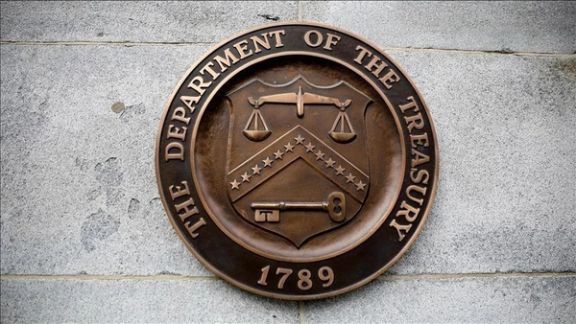
The scope of US sanctions on Islamic Republic officials is growing with more and more international punitive measures against the crackdown on dissent by the regime.

The scope of US sanctions on Islamic Republic officials is growing with more and more international punitive measures against the crackdown on dissent by the regime.
The United States Treasury Department on Wednesday imposed sanctions on several Iranian officials, including the Prosecutor General Mohammad Montazeri, and key military officials accusing them of issuing a directive to courts in September to hand out harsh sentences to many of those arrested during protests.
“We denounce the Iranian regime’s intensifying use of violence against its own people who are advocating for their human rights,” said Under Secretary of the Treasury for Terrorism and Financial Intelligence Brian E. Nelson. “The United States and our partners are dedicated to holding Iranian officials to account for egregious abuses committed against Iranian citizens fighting for their fundamental freedoms.”
Also blacklisted was Iranian company Imen Sanat Zaman Fara, which the Treasury said manufactures equipment for Iran's Law Enforcement Forces, including armored vehicles used in crowd suppression.
Washington also imposed sanctions on two senior officials of Iran’s Basij Forces, a militia affiliated with the Revolutionary Guards that has been widely deployed during the crackdown, and two Islamic Revolutionary Guard Corps (IRGC) officials. The two are Moslem Moein, the chief of the Basij Cyberspace Headquarters, and Deputy Coordinator of the Basij, Hossein Maroufi. Hassan Hassanzadeh, the commander of IRGC forces in Tehran, and Seyyed Sadegh Hosseini, the commander of the Beit-al Moghadas Corps and IRGC Commander in Kordestan province were also designated in the latest move.
The move is the latest in a series of actions Washington has taken against Iranian officials over the regime’s crackdown on the unrest ignited by the death of Amini in September.
The United States, Canada ad their European allies have united against the regime’s crackdown on protesters especially after the Islamic Republic executed two detained protesters just for participating on the rallies.
The US-based Human Rights Activists News Agency (HRANA) announced in its latest report that from September 16 until Tuesday, December 20, at least 506 protestors have been killed, of which at least 69 were minors.
While the Islamic Republic has not provided accurate figures of those detained, the watchdog went on to say that at least 18,457 protesters have been arrested including 652 students.
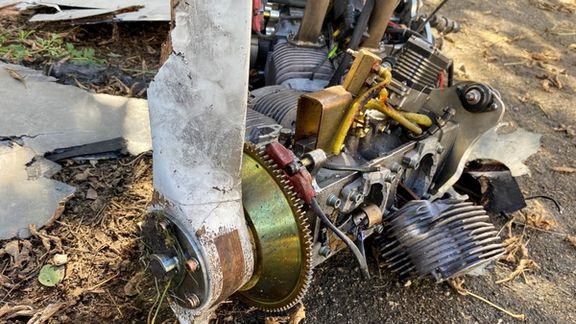
US President Joe Biden has launched a task force to see how US and western components are ending up in Iranian drones used in Russia’s war on Ukraine.
CNN reported Wednesday that different departments including Justice, Treasury, Defense, Commerce and State are involved in the task force.
Although strict measures were in effect to prevent the Islamic Republic from obtaining such materials, some evidence shows Tehran has more than enough access to US-made microelectronics that are used in manufacturing drones.
Last month, a UK-based investigative organization found that over 80 percent of the drones downed in Ukraine have components made by US companies.
Conflict Armament Research investigations revealed that processors built by Dallas-based technology company Texas Instruments as well as engines made by Austrian firm owned by Canada’s Bombardier Recreational Products have been used in the drones.
However, both tech companies in separate statements slammed the use of their products in the drones.
Bombardier Recreational Products said it had launched an investigation to see how its engines are used in the drones.
Microelectronic parts, however, are widely available to ordinary consumers even online.
Ukraine’s defense intelligence (GUR) spokesman Andriy Yusov said Monday that Russia has received a new shipment of Iranian-made Shahed-136 kamikaze drones from Iran.
Iran's foreign minister Hossein Amir-Abdollahian once again denied Iran has supplied drones to Russia to be used against Ukraine Monday, while previously he had acknowledged having provided drones to Moscow "before the Ukraine war began."
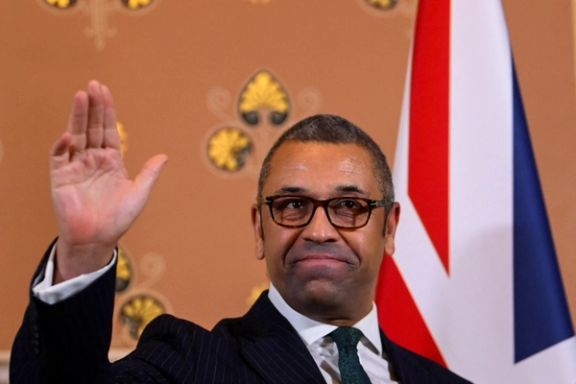
British Secretary of State James Cleverly says his country has sanctioned more than 40 officials of the Islamic Republic since the beginning of the protests in Iran.
UK’s foreign policy chief said in a tweet on Friday that “Three months ago today, Mahsa Amini died after her arrest by Iran’s 'Morality Police'. Since then, we've sanctioned over 40 Iranian officials.”
He further added that in total, the UK has sanctioned over 300 people and entities, including the IRGC in its entirety.
Nationwide protests that erupted after the death in police custody of 22-year-old Kurdish Iranian woman Mahsa Amini on September 16 have posed one of the biggest challenges to the Islamic Republic since its establishment in 1979.
Britain announced sanctions December 9 against 30 people worldwide, including Iranian officials, for serious rights violations, such as the violence on protesters.
Iran executed the first detained protester December 8 after a sham trial, sparking worldwide outrage and condemnations. The execution is seen as part of a government strategy to intimidate ordinary people and activists from pursuing the almost three-month-old antigovernment protests movement.
In mid-November, Britain had slapped a new round of sanctions on 24 Iranian officials who played a role in cracking down on protests.
In a press release the United Kingdom announced that the “sanctions target officials within the Iranian regime who are responsible for heinous human rights violations.”
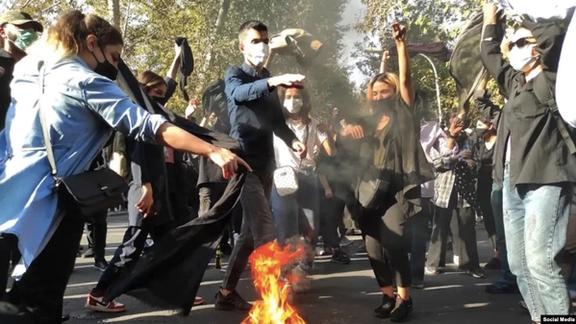
Despite all the tactics the Islamic Republic used to keep its seat at the UN women’s commission, the international community dealt another blow over its rights violations.
In its last session of the year, 29 members of the 54-member UN Economic and Social Council (ECOSOC) voted in favor of a US-drafted resolution to "remove with immediate effect the Islamic Republic of Iran from the Commission on the Status of Women (CSW) for the remainder of its 2022-2026 term."
The move was the first time in United Nations history that a country was expelled from the commission, and the second blow to the Islamic Republic over its brutal crackdown on protests sparked by the death of 22-year-old Mahsa Amini in custody of hijab police. The first step to hold the Islamic Republic accountable was creating a fact-finding mission by the Human Rights Council. The Geneva-based UN Human Rights Council voted on November 24 to launch an independent investigation into the regime’s deadly repression that has killed around 500 civilians, including about 60 children.
Iran had tried its best to keep itself part of the commission through rallying its allies and a behind-the-scenes campaign to exert pressure on academic figures to send letters to numerous global bodies to urge them vote against the move. However, the result of was not unexpected as the regime’s membership in the commission was repeatedly condemned even before the current wave of protests.
During the Wednesday session, the Islamic Republic and its friends, including China and Russia, argued that the expulsion of Iran sets a precedent that may be used against other members in the future. As usual, Tehran’s main strategy was not to address the problem directly but instead accuse other countries of human rights violations.
Another strategy of the pro-Tehran camp was to count on countries that have grievances against the US. Iran's UN Ambassador Amir Saeid Iravani called the move illegal, describing the United States as a bully. "The US request is entirely illegal, as the Council members are fully aware that there is no precedent in the council practice of terminating an elected member's participation in a functional commission for any other reason,” Iravani said.
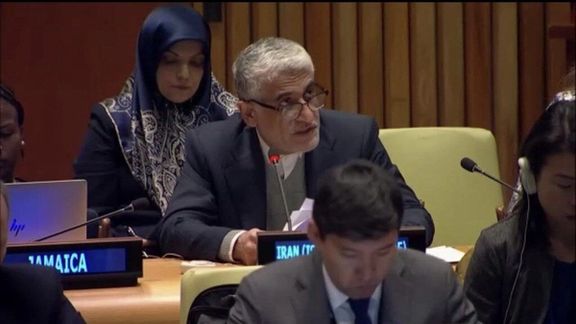
The Russian envoy also tried to make the best use of UN technicalities to stop the vote, asking for a legal review of the draft, but Moscow’s motion was annulled by a quick vote before the main decision.
China's Deputy UN Ambassador Geng Shuang said, "Addressing human rights and women's issues by means of removing Iran from CSW would only set a dangerous precedent, send out the wrong message and bring about negative consequences."
The countries in favor of expelling Iran from the CSW were of the opinion that its membership would be a stain on the name of the commission as the principal global intergovernmental body exclusively dedicated to the promotion of gender equality and the empowerment of women. The text of the draft resolution denounced Iran's policies as "flagrantly contrary to the human rights of women and girls and to the mandate of the Commission on the Status of Women."
Referring to the Iranian protesters, US Ambassador to the UN, Linda Thomas-Greenfield, told ECOSOC that "These women and activists have appealed to us, the United Nations, for support. They made their requests to us loud and clear -- remove Iran from the Commission on the Status of Women.”
She argued that it cannot do its important work “if it's being undermined from within. Iran's membership at this moment is an ugly stain on the commission's credibility.” She noted, “There are few, obviously, right and wrong answers in diplomacy. But today, today we have an opportunity to do something that is clearly the right thing to do. We can act in this moment to support women. We can act in direct response to our constituents, the global community of women.”
The move has been welcomed by many Western countries, many Iranians and activists. In a statement after the vote, US National Security Advisor Jake Sullivan described it as yet “another sign of the growing international consensus on Iran and demands for accountability.”
“Over the last week alone, the United States has issued three separate sets of sanctions targeting Iran’s financing of terror, protest-related human rights violations, and provision of UAVs to Russia for attacks against Ukraine’s critical infrastructure. We have acted in coordination with the EU, UK, Canada, Australia, and others who have issued new sanctions under their own authorities," read the statement.
Israeli Prime Minister Yair Lapid also praised the decision, saying, "Iran's killing of Mahsa Amini and its blatant violations of women's rights disqualify it from being a member of a committee that deals with women's rights.”
Canada-based activist Hamed Esmaeilion, whose daughter and wife were killed by the IRGC, also hailed the action, calling the regime authorities “the enemies of women, life and freedom.”
Former Donald Trump State Department spokesperson Morgan Ortagus tweeted, “Victory! The Iranian regime has been kicked off the UN Women’s Commission! At last, a small but important measure of accountability against the Islamic Republic of Iran for their gender apartheid and crimes against women."
Iranians in several cities, including the capital Tehran and in the Kurdish city of Saqqez, the hometown of Mahsa Amini, poured out onto streets celebrating the decision. Most of them see this as a victory because it may lead to more international measures, or at least make the regime retreat from its iron-fisted crackdown.
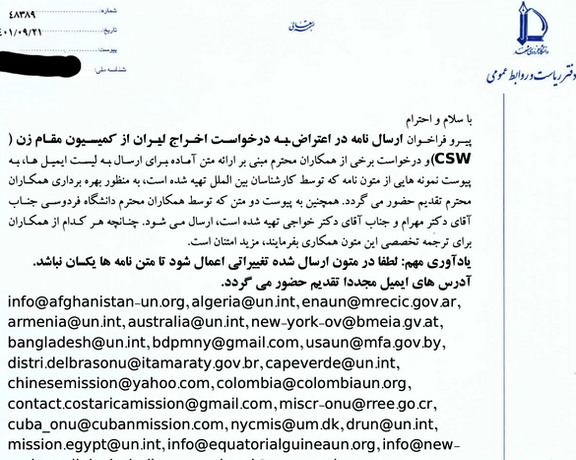
On the eve of a vote to expel the Islamic Republic from the UN women’s commission, leaked documents reveal a behind-the-scenes campaign to stop the move.
According to some documents obtained by Iran International, the Iranian regime is exerting pressure on academic figures to send letters to numerous global bodies to urge them to vote against the move. Among the documents are an official letter from an advisor of the head of Ferdowsi University of Mashhad to her colleagues with the list of emails of UN missions and a list of points to be mentioned in the correspondence by the professors.
The Commission on the Status of Women (CSW) is the principal global intergovernmental body exclusively dedicated to the promotion of gender equality and the empowerment of women. The 54-member UN Economic and Social Council (ECOSOC) will vote on whether to oust the Islamic Republic from the commission on December 14.
In the documents, a list of email addresses of UN missions of many countries as well as rights groups were provided, and university professors were asked to write to them in an attempt to prevent Iran’s expulsion initiated by the United States and supported by others. Samples letters were also given to the academics to use them as templates, but they were asked to change the wordings of the letters a bit so that it would not be obvious that they were part of a state-orchestrated campaign.
The sample letters are a collection of the regime’s propaganda lines blaming foreign powers for the current wave of protests that began in mid-September following the death of 22-year-old Mahsa Amini in custody of hijab police. Such hackneyed lines include blaming other countries for instigating the rallies, blaming the US for using UN mechanisms as political tools, and blaming sanctions by Western countries as the main reason behind the country’s economic woes.
The academics were also asked to mention the claims that women and men enjoy equal rights in the Islamic Republic and that Iranian women have been present in all economic fields and have made great achievements. Such bogus claims were also read out during a UN Human Rights Council meeting late in November held to discuss the deteriorating situation in Iran, especially with respect to women and children.
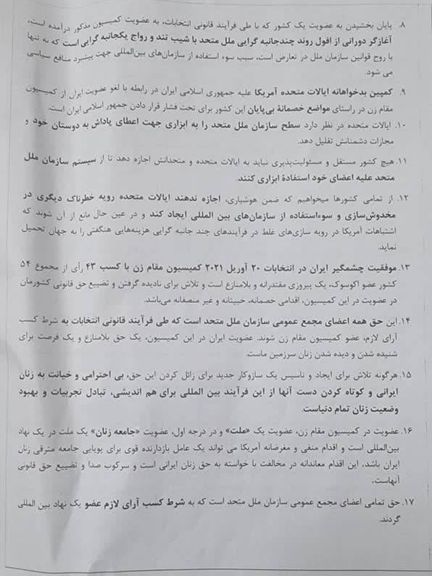
The equality of men and women in Iran is evidently untrue. The Islamic Republic’s constitution clearly states that women are considered as inferior to men in terms of inheritance, testifying in courts and in many other areas according to the Islamic law or sharia. Women in Iran are not allowed to travel abroad without the permission of a male guardian, their share in inheritance is half of what male family members receive -- the financial compensation paid to the victim or heirs of a victim in cases of death, is also half of that of a man.
Among the other points that the academics were asked to mention in their letters to members of the commission is warning them that the expulsion of the Islamic Republic sets a precedent that may be used against other members in the future.
The first step by the United Nations to hold the Islamic Republic accountable for its crackdown on protesters was creating a fact-finding mission by the Human Rights Council and the second move can be the vote to kick the regime off the Commission on the Status of Women. The Geneva-based UN Human Rights Council voted on November 24 to launch an independent investigation into the regime’s deadly repression of protests that has killed around 500 civilians, including about 60 children.
Late in November, the United States circulated a draft resolution on the move, that denounces Iran's policies as "flagrantly contrary to the human rights of women and girls and to the mandate of the Commission on the Status of Women." The US-drafted resolution would "remove with immediate effect the Islamic Republic, which has just started a four-year term on the 45-member commission.
In an interview with MSNBC Sunday US Special Envoy for Iran Robert Malley said, “it makes no sense for Iran to be sitting on a commission whose role is to promote the rights of women when they are doing exactly the opposite.”
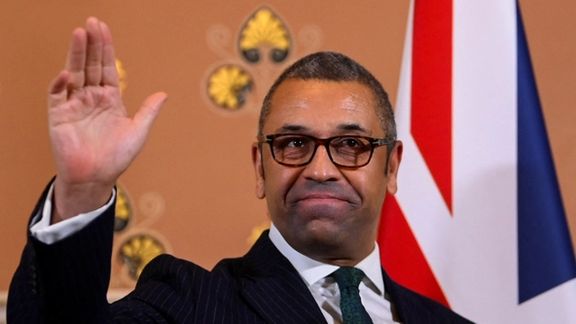
More than nine months into the Ukraine conflict, the UK Tuesday sanctioned an Iranian company and three people over supplying “second rate” drones to Russia.
The Oje Parvaz Mado Nafar, its director Yousef Aboutalebi were designated along with Brigadier General Abdollah Meehrabi, a military research head, and Afshin Khajeh Fard, head of Iran’s Aviations Industries Organization. A press release from the British foreign office cited James Cleverly, the foreign minister, saying that MADO was “the company responsible for manufacturing engines for the drones…used by Russia in Ukraine.”
Any assets held in the United Kingdom by those sanctioned can now be seized. The individuals will not be permitted to enter the UK, and no British citizen may transfer money to them.
The UK also designated 12 Russian military commanders, “including [those leading] units implicated in attacks on Ukrainian cities.” The press release noted that “directing attacks against civilians and civilian objects is a serious violation of international law – those responsible must be held to account.”
This followed the European Union Monday designating four individuals, including the head of Iran’s air force, over alleged drone supplies, as well four military contractors or design companies. This came in addition to two Iranian military commanders in November. Both the UK and the EU say the sanctions are intended to change the behavior of those sanctioned.
Cleverly said UK sanctions were “taking the wheels off the Russian war machine.” The press release referred to “information” released by the US December 9 - apparently a statement by White House Security spokesman John Kirby - showing Iran had become “one of Russia’s top military backers.”
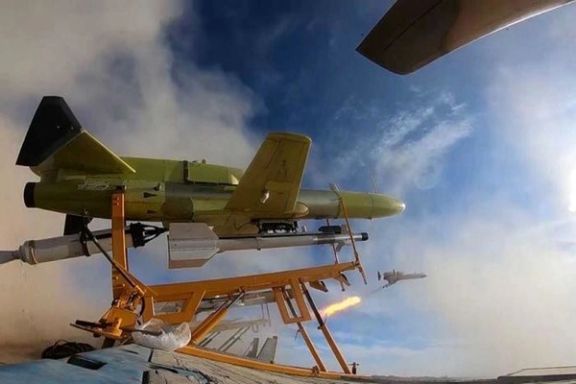
Kirby spoke mainly then of US “concern” that Russia “intended to provide Iran with advanced military components,” while senior US officials were widely quoted that Russia was ready to send Sukhoi SU-35 fighter jets to Iran, which has been unable to acquire modern fighters since the 1990s.
In other anonymous briefings, the Washington Post quoted a US “military official” December 9 that Russia had Iranian ballistic missiles, and that Tehran would receive “up to $1 billion” and “other, still unknown inducements” for setting up drone productions inside Russia. Kirby was one of two US officials saying on-the-record the same week that the US had no evidence of Iran transferring missiles to Russia.
‘Desperate need’
The UK press release explaining its latest sanctions reiterated that Iran sending “hundreds of drones to Russia” violated “its international legal obligations,” presumably referring to the US and UK argument this would violate a clause in United Nations Security Council Resolution 2231, which endorsed the 2015 Iran nuclear deal, an agreement the US left in 2018 imposing ‘maximum pressure’ sanctions on Iran to slash its international trade.
Cleverly said the “Iranian regime” was “isolated internationally” due to “brutal repression of its own people” and a “threat it poses in the Middle East” and was therefore “in desperate need of support from [Russian President Vladimir] Putin.”
Former British prime minister Boris Johnson called this week in the Wall Street Journal for Nato to give Ukraine longer-range missiles including ATACMS (surface-to-surface missiles with a 300km range), but he also suggested the war could end with Russian retaining regions held before February 24. Ukrainian President Volodymyr Zelenskyy rules this out, with the US saying publicly it’s up to him to decide.
UK and US officials maintain their approach - arming Ukraine but not sending the most offensive weapons Zelenskyy demands – is slowly degrading Russian capacities. British military aid to Ukraine has reached £2.3 billion ($2.84 billion) and US aid $20 billion. The EU agreed Monday €2 billion ($2.1 million) in addition to the €2 billion already sent.
“Defence Intelligence reports suggest that Russian armed forces are struggling to replenish their missile reserves,” Cleverly said, according to the British press release, “while they are increasingly forced to rely on second rate [sic] drones supplied by Iran to keep up their inhumane bombardments of the Ukrainian people.”